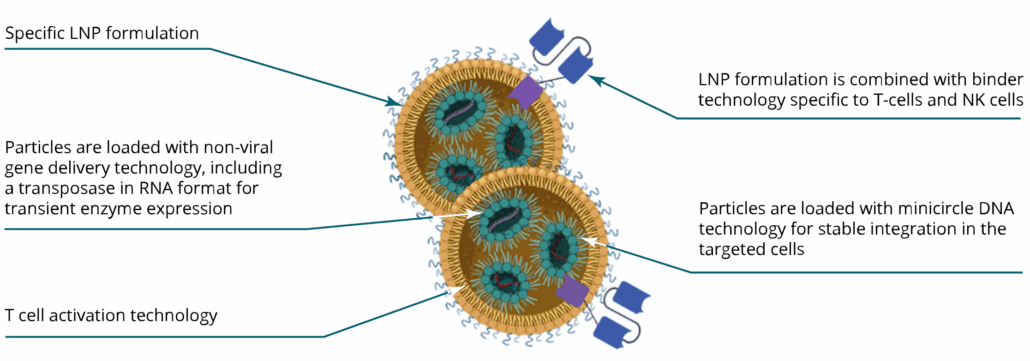
CPTx and NanoCell Therapeutics secure Eurostars grant to develop non-viral in-vivo CAR-T therapies
German CPTx GmbH, its CDMO Gxstrands, and the US start-up NanoCell Therapeutics have been awarded a Eurostars grant for their QUIET-CAR project, funded through the EU’s Horizon Europe programme and the Eureka Network. The focus of the project will be on the development of scalable in-vivo CAR-T therapies against cancer and autoimmune diseases.
The Eurostars grant awardees , CPTx GmbH (Planegg, Germany) and NanoCell Therapeutics (Berwyn, US, Utrecht, The Netherlands), were selected from 120 applications. The QUIET-CAR consortium is focused on advancing in-vivo CAR-T cell therapy, specifically aiming to engineer CAR-T cells directly within the patient’s body. This approach, distinct from traditional ex vivo CAR-T therapies, involves using non-viral vectors to deliver the CAR construct to T cells in vivo, potentially offering advantages in terms of scalability and accessibility.
Within the Eurostars project, CPTx will collaborate with US-headquartered NanoCell Therapeutics Inc., which will contribute its targeted lipid nanoparticle (LNP) DNA delivery plattform (see graphic), and the CDMO Gxstrands, which specialises in the manufacturing of CPTx’s and other single-stranded DNA (ssDNA), enabling the large-scale production of customisable single-stranded DNA sequences with flexible topology and lengths of up to and beyond 10 kb.
CPTx is pioneering a new kind of in vivo CAR T-cell therapy using immune-silent single-stranded DNA (ssDNA) delivered by NanoCell Tx’s LNPs with in-built tropism. According to the companies, this virus-free in vivo approach allows repeat dosing, long-lasting effects, and precise control—something not possible with viral vectors or mRNA.
NanoCell’s ultimate goal is to convert adoptive cell therapies such as CAR-T cell therapy into scalable, cost-efficient, and safe gene therapies. For the project, it will provide its targeted LNP delivery technology that will help integrate proprietary ssDNAs provided by CPTx into the genome of T or NK cells and activate those cells in the targeted tissue.
CPTx (Composite Programmable Therapeutics), a 2021 spin-out from the Technical University of Munich, will contribute its ssDNA origami technology to target, modify, and activate immune cells such as T or NK cells in vivo.
The combined approach adeptly overcomes some challenges associated with ex vivo CAR-Ts or CAR-NKs: from soaring production expenses and extended timelines to potency limits and the inherent toxicity risks of using large volumes of bead-activated cells. It also circumvents the operational intricacies of today’s conventional cell therapy treatment model or protocols. By engineering a select group of non-exhausted effector cells in their natural state to express chimeric antigen or T cell receptors in vivo, there is potential to cultivate a robust effector repertoire in individuals with an intact immune system. Such cells are primed to organically thrive, strategically combat cancer cells, and provide enduring protection, building a resilient cellular defence for the future. However, cytokine release syndrome and neurotoxicity remain as potential adverse effects of this therapeutic approach.




 Freepik.com
Freepik.com